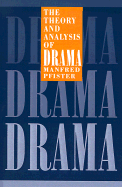Book contents
- Frontmatter
- Contents
- Preface
- Translator's note
- A note on the English edition
- 1 Drama and the dramatic
- 2 Drama and the theatre
- 3 Sending and receiving information
- 4 Verbal communication
- 5 Dramatis personae and dramatic figure
- 6 Story and plot
- 7 Structures of time and space
- Concluding note
- Notes
- Bibliography
- Index of authors
2 - Drama and the theatre
Published online by Cambridge University Press: 01 June 2011
- Frontmatter
- Contents
- Preface
- Translator's note
- A note on the English edition
- 1 Drama and the dramatic
- 2 Drama and the theatre
- 3 Sending and receiving information
- 4 Verbal communication
- 5 Dramatis personae and dramatic figure
- 6 Story and plot
- 7 Structures of time and space
- Concluding note
- Notes
- Bibliography
- Index of authors
Summary
Literary text and stage-enactment
Literary versus theatrical reception
The literary historian is not always quite as sharply aware of the importance of non-verbal codes for the dramatic text as the dramatist. Poring over his printed texts, the former tends to neglect the multimedial aspect of theatrical performance, whereas the latter regards this as a crucial component of the literary text. For, in the words of Max Frisch:
Whoever appears on the stage and does not make proper use of the stage will find it working against him. Making use of the stage means: not being just on it, but with it.
Like Frisch, Ionesco is another to emphasise the unity of the multimedial dramatic text, maintaining that to strip it down to the bare minimum would be an inexcusable aberration and abbreviation:
… mon texte n'est pas seulement un dialogue mais il est aussi ‘indications scéniques’. Ces indications scéniques sont à respecter aussi bien que le texte, elles sont nécessaires.
Statements such as these seem particularly important at a time when, for various socio-cultural reasons, plays – at least the non-trivial ones – are more often read than seen in the theatre. They apply particularly to the institutionalised study of dramatic texts at schools and universities, where they are frequently stripped of their theatrical qualities. Dr Johnson's neoclassical dictum: ‘A play read affects the mind like a play acted’, can only be true of the reader who is able to bring the numerous explicit and implicit signs and signals inherent in the literary text to life in his imagination.
- Type
- Chapter
- Information
- The Theory and Analysis of Drama , pp. 13 - 39Publisher: Cambridge University PressPrint publication year: 1988



